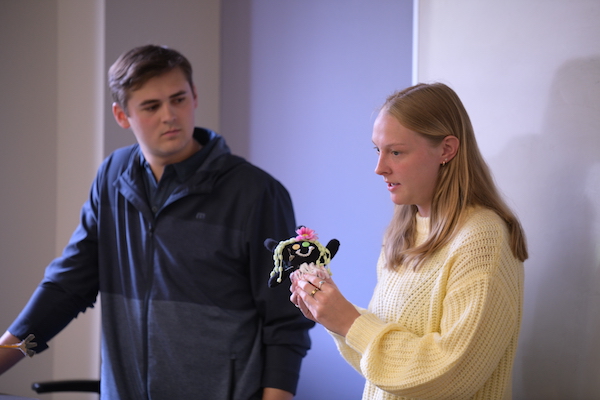President's Blog: From the Heart

Of Life, Love and Puppets
By Eric F. Spina
John Zaller showed off a bright red cardinal he made out of recycled plastic cups as part of his group’s final presentation in the Latino/Latina Religious Experience course.
“A cardinal landed on the window sill outside my mother’s hospital room a couple of days after my brother was born. My puppet represents my brother Noah, who died when he was a couple of weeks old. I feel Noah is living through me,” said the junior entrepreneurship major from Cleveland.
I was moved by the deeply personal stories of John and his classmates about their puppets, which they created out of repurposed materials — salsa jars, scraps of colorful fabric, and outdated flyers from campus bulletin boards, to name a few everyday artifacts they scavenged for the project.
Their assignment? To recreate the spirit of Días de los Muertos, a Mexican holiday commonly known as “The Days of the Dead,” and connect the Latino/Latina religious experience with their own lives and Catholic intellectual traditions.
Typically this type of course is taught at one level — undergraduate or graduate. At UD it’s an upperclass Common Academic Program (CAP) elective that helps our students understand and appreciate how the Roman Catholic faith is practiced in cultures other than their own. It is also taught at the master’s and Ph.D. levels with all classes taught by Dr. Neomi De Anda, a lay Marianist, recipient of the 2021 Faculty Award for University Teaching, and past president of the Academy of Catholic Hispanic Theologians of the United States.
“The first part of the course is historically based,” Professor De Anda told me as the class wrapped up. “We study various Native Peoples of the Americas and the pluralities of what it means to be part of this giant umbrella in the U.S.A. We talk about differences and the complexities behind identities with a focus on Catholic themes, such as interreligious thought and justice, which I’ve defined as building better relationships.”
Over the course of the semester, the students studied Orlando Espín’s Wiley-Blackwell Companion to Latina/o Theology and the Pew Research Center’s survey, “The Shifting Religious Identity of Latinos in the United States.” They listened to podcasts, read scholarly articles, and watched “Bless Me Ultima” and the Academy Award-winning “Coco,” a Walt Disney animated film inspired by the Days of the Dead.
As the semester neared its end, students in one group compared ofrendas — home altars filled with photos, memorabilia, marigolds, skeletons representing the professions of their loved ones, candles, a crucifix, and the favorite foods and drinks of the deceased — to ancient Judeo altars and early Christian ones.
“Ultimately altars across cultures have extreme reverence and represent a cultural emphasis on sacrifice,” explained Jack Westermeier, a junior finance major from East Aurora, New York. “Families create an ofrenda to honor the dead by emphasizing the sacrifices they made on earth.”
Another group talked about traditional foods served during Días de los Muertos, such as tamales, pan de muerto (“bread of the dead”) and colorfully decorated sugar skulls. I learned that indigenous people view the skull as a symbol of life, not death.
But the students’ creative, handcrafted puppets and their earnestness about the significance of the items stole the day and my heart.
From a puppet of a beloved uncle in a newsboy’s hat to an Italian grandmother with pasta for eyes, the students transcended cultures and customs to communicate the love that bind families across generations.
After all, that’s what this course and its final assignment are all about — blurring the lines of difference to find our common humanity — which is a great example of how an innovative instructor such as Professor De Anda can reach students and help them learn lessons of lasting value.
(Photo by Larry Burgess)
